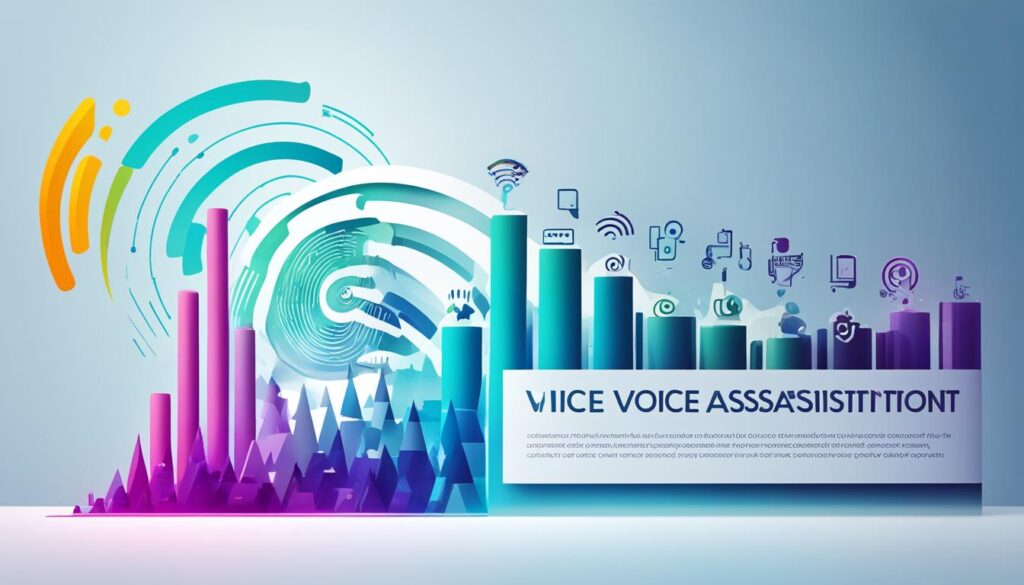Welcome to our detailed guide on AI voice assistant development. Here, we dive into the newest insights and trends. AI voice assistants, like Amazon’s Alexa and Apple’s Siri, have changed how we use technology. They use advanced tech to understand us and respond.
Today, more people want to create virtual assistants than ever. Developments in AI technology, like ChatGPT, are breaking new ground in the virtual assistant world.
By the end of 2023, the US could have 145.1 million voice assistant users. Google Assistant leads, followed by Siri and Alexa. This data shows how essential these assistants have become in our daily routines.

We’ll cover the story of voice assistants, their connection to generative AI, and many ways they’re used. We’ll also see how they benefit the workplace, making it more efficient and accessible.
But, we can’t overlook the issues of privacy and security with AI. Since they deal with personal data, it’s vital for organizations to keep that info safe and use AI responsibly.
Thinking about ethics is also key. AI must be transparent and fair to avoid biased or unfair results. Regular checks are needed to keep the AI’s actions ethical and clear.
The future looks bright for AI voice assistants. Improvements in tech will make these assistants more trustworthy and capable. Using AI responsibly can open ways to a better future with technology.
In this guide, we’ll introduce you to industry leaders and share stories of successful AI assistant use in companies like Voiceflow. These stories will show how AI assistants are making work easier and more innovative.
Come with us on this exciting adventure. We’re going to explore AI voice assistant development, finding new ways for tech to make work better and more efficient.
Evolution of Voice Assistants and Generative AI
Voice assistants have come a long way, moving from basic command systems to advanced AI companions. Technologies like ChatGPT have ushered in a new age for them. This era focuses on giving voice assistants the ability to hold more intuitive and human-like conversations.
Today, the tech world is all about using AI to make voice assistants better. This new tech makes them able to talk with us in more personal ways. They can now understand more, respond better, and feel like you’re chatting with a person.
Thanks to generative AI, voice assistants can do a lot more. They predict what you need, share helpful info, and even chat with you. This tech breakthrough turns voice assistants into essential helpers for everyday life, entertainment, or work.
As tech gets better, voice assistants are becoming truly smart. They’re learning to understand our needs even better and are getting really good at answering tough questions.
Generative AI is changing how we see voice assistants. Now, they can be like friends, making life easier without us even noticing. This is all thanks to the amazing power of AI.
Use Cases and Integration of Voice Assistants
Businesses use voice assistants to make things better for their customers. They are adding AI voice assistants to call centers and customer tools. This change is making how companies talk with customers better.
Banks and other finance companies are quickly adding voice assistants. They help customers with their questions using only their voice. This makes talking to a bank faster and easier.
Voice assistants help companies save money by doing some jobs automatically. They offer customer help all day and night, too. This means companies can help their customers anytime.
Voice assistants also make teamwork smoother. They help teams with tasks like setting up meetings and sharing info. This makes everyone work better together.
Companies are using tools from Google and IBM to add voice assistants to their apps. These tools make it easy to bring AI voices to different apps. This gives companies the tools they need to grow.
Voice assistants are making businesses better at helping customers, working well, and cooperating. They are becoming a key part of how companies run. As AI gets better, we can expect even more changes in how businesses use voice assistants.
Advantages of AI Voice Assistants
AI voice assistants are crucial in the workplace. They boost efficiency, make tasks more accessible, and can grow with your needs. These assistants use advanced tech like machine learning and natural language processing. This makes regular work tasks easier, saving you both time and energy.
Improved Efficiency
One big plus of AI voice assistants is their knack for automating repetitive tasks. They can handle scheduling, email management, and other everyday jobs. This leaves you free to tackle more strategic, important work. Letting AI handle the boring stuff helps you get more done in less time.
Round-the-Clock Accessibility
AI voice assistants never sleep, offering help 24/7. Need something at odd hours or on weekends? They’re there for you. This all-time access means you get the info or help you need right when you need it. This boosts how efficiently you work and cuts down on delays.
High Scalability
As your business expands, AI voice assistants can grow with you. They handle more and more tasks without slowing down. This means you can trust them to keep up, even as your business blossoms. No more hold-ups as you scale up.
Personalized Interactions
AI voice assistants provide answers and suggestions tailored just for you. They get smarter from your chats and know what you like. This makes their help more focused and on point. The more they know you, the better they assist you.
In the end, AI voice assistants enhance your team’s efficiency and accessibility. They support you as your business expands. Plus, they learn from you, giving you personalized help. With these tools, businesses can smooth out their processes, do more, and reach for growth.
Privacy and Security Considerations
AI assistants bring up big worries about privacy and security. We need to be careful when letting them access our personal info, like emails or health data. It’s vital for companies to use strong security steps, such as encryption, to keep our info safe.
Along with keeping data safe, it’s vital that AI is open and fair. AI helpers should be clear about how they use our info. They also need to be designed so they don’t unfairly target certain people or groups.
Working on these privacy and security issues helps people trust AI more. Trust is super important for AI to be widely used. So, companies need to do their best to keep users’ trust strong for AI assistants to succeed.

Image: Protecting privacy and ensuring security are paramount in AI assistant technology.
Privacy Measures
AI assistants must protect our privacy well. Companies should spell out how they’ll keep our info safe. They must let us control our own personal data.
Steps like making data anonymous, minimizing how much data they keep, and storing it securely are critical for our privacy.
Data Security
Keeping data safe is key to stop hackers or other bad actors. AI systems should use top-notch encryption and be checked often for security. They also need to control who can see what info, to keep sensitive data safe.
Algorithmic Transparency and Fairness
Making AI’s decisions clear and free from biases is really important. It’s essential that AI companies show how their systems work and make decisions. Checking AI regularly can find and fix any unfair biases, making sure everyone gets a fair deal.
Ethical Implications of AI Assistants
Using AI for AI assistants involves big ethical questions. It’s important to avoid biases in these algorithms. These biases can cause unfair decisions. So, being clear about how these algorithms work is vital.
Companies must check their AI systems for any unfairness. They should look for and fix biases. This helps to make sure the AI is fair and open for everyone.
Biased algorithms are especially worrisome in certain areas. For example, in jobs, loans, or court cases. Ignoring these biases could keep unfairness going.
Making AI fair and clear is a must-do. This builds trust with the people using it. They should feel sure AI’s choices are fair and not wrongly favoring anyone.
As AI assistants get more common, the big picture is crucial. We need to think about how they affect communities and our society. This goes beyond just one person’s use.
Handling the ethics of AI assistants is a team effort. It needs work from many groups like researchers, developers, and the public. Balancing new ideas with fairness is key for a better future with AI.
Future Outlook for AI Voice Assistants
The future of AI voice assistants looks bright with upcoming advancements. These advances are fueled by new discoveries in generative AI and other state-of-the-art tech. As these assistants get smarter, they will better understand us, increasing our trust in them.
By combining AI with voice tech, the way we interact with devices will become more natural. This will make our experiences with tech better. With more progress, AI voice assistants may grasp our feelings and the full meaning behind what we say.
Yet, we must deal with privacy issues for AI voice assistants to be widely accepted. Since they deal with private info, ensuring strong security and ethical use is vital. This going the extra mile to protect user data helps build trust.
Using AI assistants responsibly allows for more innovation and productivity in many fields. Businesses will leverage these assistants to improve services, make operation smoother, and boost their growth in the digital world.
As tech aims to better society, AI assistants will serve an important function. Their potential for endless growth and ability to work well with other tech is promising. We are looking at an innovative future with these AI voice assistants at its core.

Key Players and Success Stories
Many companies, like AI voice assistant firm Voiceflow, have used AI assistants to boost their work. Voiceflow got $15 million in funding. They work with top names like Amazon and JPMorgan Chase. This shows how AI assistants are changing the game in many fields.
With AI tech, businesses can lead in tech. It helps them work better and give customers a great time. This makes the companies stronger and more effective.
Stories like what Voiceflow has done push others to try AI too. As more see the benefits, they want AI assistants too. This trend helps businesses find new paths to success in the digital world.
Driving Innovation with AI Integration
Companies that use AI voice assistants can be leaders in innovation. These assistants use smart AI technologies to offer easy and quick solutions.
By handling simple tasks, AI assistants let people work on important things. They use smart speech tech to make talking with them easy and nice.
AI assistants are great from customer care to helping teams work together. They make work better, faster, and impress customers. Using AI, businesses can grow, be creative, and make customers happy.
Conclusion
AI assistants have changed how we work for the better. They use smart technologies and make tasks simpler. This includes things like learning from data and understanding human speech. They promise a future full of new opportunities as they get smarter.
They promise a big change in work, improving both how we do things and coming up with new ideas. But, we need to be careful. We must make sure they keep our information safe and stick to the right ways of doing things.
By using AI assistants the right way, we can make a team out of humans and technology. Working together, they’ll help us do more, work smarter, and around the clock. This can lead to a world where tech and what we can do combine for good.
The future with AI assistants seems very bright. They’re going to make work better for us and help businesses work with tech in fresh ways. From helping customers faster to making work tools work better, they have a lot to offer.
To sum up, AI assistants are already doing a lot for us and have lots more to give. With the right use and making sure they do things the way they should, we can look forward to an exciting future. One where we, tech, and doing our best work together is the norm.
FAQ
What are AI voice assistants?
AI voice assistants are virtual helpers. They understand human speech through special algorithms. Then, they reply in a way that sounds like a real person.
How have voice assistants evolved over time?
At first, voice assistants could only act on commands. But now, they use advanced AI. For example, ChatGPT has brought new abilities to these assistants.
How are voice assistants integrated into different applications?
Voice assistants work in many areas, like call centers and helping customers. Google’s Dialogflow and IBM’s Watson help put AI into these services.
What advantages do AI voice assistants offer in the workplace?
They can do simple tasks, like answering questions, without a break. This saves time and makes work more personal. They can fit any job size, too.
What are the privacy and security concerns associated with AI assistants?
To keep important secrets safe, companies must secure these AI helpers. They must also make sure the AI is fair and clear to everyone.
What are the ethical implications of AI assistants?
Keeping AI fair and open is very important. Wrongly made AI can treat people unfairly. This shows why fairness and openness matter.
What does the future hold for AI voice assistants?
Future AI assistants are set to get better with time. They will understand us more clearly. This could build more trust with the people who use them.
Who are the key players and success stories in the AI voice assistant industry?
Voiceflow is a big name here. It helps giant companies like Amazon with AI voice assistants.
What is the potential impact of AI assistants on work productivity?
AI assistants are changing how we work. They use the latest tech to help us work better. This makes work more efficient and creative.

